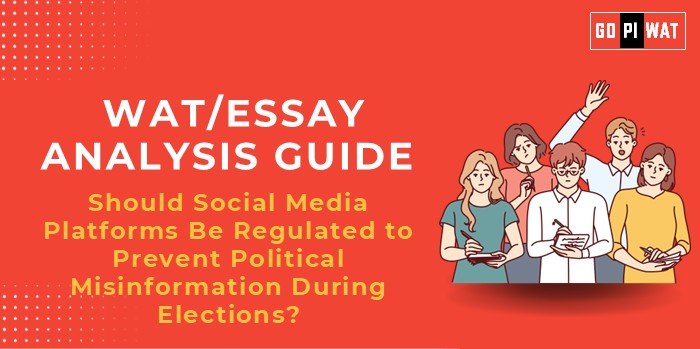📋 WAT/Essay Analysis Guide: Should Social Media Platforms Be Regulated to Prevent Political Misinformation During Elections?
🌟 Understanding the Topic’s Importance
The intersection of technology, governance, and democracy is at the forefront of global discourse, particularly during elections. Regulating social media to prevent misinformation reflects the need to balance technological freedom and democratic integrity.
📝 Effective Planning and Writing
- Time Allocation:
- Planning: 5 minutes.
- Writing: 20 minutes.
- Review: 5 minutes.
- Introduction: Use contrasting or timeline approaches to set the context.
- Body Paragraphs: Explore achievements, challenges, and future outlooks for a balanced analysis.
- Conclusion: Summarize the balanced view or offer a forward-looking perspective.
📋 Essay Structure
✅ Achievements:
- Highlight initiatives like Meta’s fact-checking programs to curb misinformation during elections.
⚠️ Challenges:
- Discuss enforcement difficulties, the global digital divide, and concerns over stifling free speech.
🌍 Future Outlook:
- Propose transparent regulatory frameworks and collaborative efforts among stakeholders, including governments and tech companies.
📌 Concluding Templates
- Balanced Perspective: “Effective regulation requires collaboration between governments, tech companies, and citizens to safeguard democracy without stifling freedoms.”
- Future Focus: “As elections increasingly intertwine with technology, proactive and transparent regulation is essential for the integrity of democratic processes.”
🔍 Recommendations for Sustainable Progress
- Policy Suggestions: Develop global misinformation benchmarks to guide platform accountability.
- Technological Innovations: Invest in AI-driven moderation tools to detect and counter misinformation in real-time.
- Civic Education: Enhance digital literacy programs to empower citizens to identify and report misinformation.
🖋️ Sample Short Essays
1. Balanced Perspective:
“Social media regulation during elections is a necessary step to prevent misinformation and safeguard democracy. However, striking a balance between curbing fake news and preserving free speech requires transparent and accountable frameworks.”
2. Solution-Oriented:
“Tech companies must collaborate with governments to deploy AI tools for detecting misinformation. Such synergy is crucial for maintaining electoral fairness without suppressing individual freedoms.”
3. Global Comparison:
“While countries like Estonia demonstrate the success of digital safeguards, others, like Myanmar, highlight the risks of regulatory failures. Tailoring such strategies to social media can enhance election security worldwide.”


